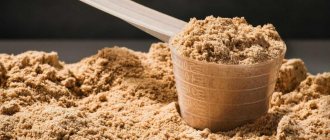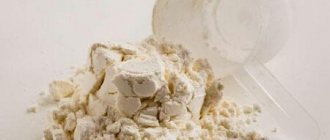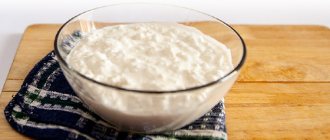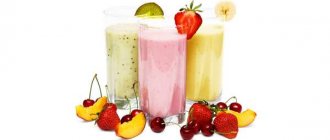Share:
Vegetarians, like vegans (people who adhere to an even stricter diet), do not eat meat, but unlike the latter, they use dairy products. The source of proteins for representatives of the first group is cottage cheese and sour cream, and for vegans - beans, soybeans, nuts and lentils. This article goes into more detail about natural sources of protein for vegetarians.
The main disadvantage of plant foods is the lack of creatine and some other essential amino acids found in animal products. For this reason, athletes of the two groups mentioned above are forced to drink protein shakes. Depending on the intensity of training per day, it is recommended to consume 1.1-2.2 g of protein per 1 kg of the athlete’s weight.
Pea protein
Pea protein powder is not made from sweet green peas, but from their higher protein cousin, yellow split peas.
A 28-gram serving of pea protein contains about 21 grams of protein and 100 calories, depending on the brand. Like other legumes, it contains small amounts of the amino acid methionine (,).
However, pea protein is especially rich in the essential branched chain amino acids (BCAAs), leucine, isoleucine, and valine, which help muscle function and stimulate your body to produce muscle protein ().
In one 12-week study, 161 young adults took 25 grams of pea protein twice a day, including immediately after exercise. The weakest participants had a 20% increase in biceps muscle mass compared to 8% in the placebo group.
Moreover, the muscle gains associated with pea protein were similar to the muscle gains seen in people consuming whey (milk) protein ().
Animal and human studies also show that pea protein may promote a feeling of fullness in the stomach and lower blood pressure (, , ).
Summary:
Pea protein is rich in branched chain amino acids, which help in building muscle mass. Preliminary research suggests that it is as effective as whey protein in increasing muscle mass. It may also help you feel full and lower your blood pressure.
The benefits of vegetable protein
Plant protein is of great importance for the body and its consumption is no less important than animal protein. This is easily explained by the fact that each individual product has its own structure of protein molecules, which are absorbed by the body differently and give their own special effect. For this reason, a combination of animal and plant protein is important for humans.
Plant protein has its own special molecular structure, which helps the rapid absorption of this type of protein. Despite the fact that it is easily digestible, part of it is not processed due to the fact that plant products contain much more coarse fiber. But this helps maintain the normal functioning of the gastrointestinal tract and produce “good” cholesterol, preventing deposits of “bad” cholesterol from developing in the blood vessels.
Plant foods contain large quantities of unsaturated fats, which helps normalize the functioning of the cardiovascular system. They help keep the heart vessels clean, and also prevent the formation of fatty plaques, and prevent the development of diseases such as atherosclerosis.
If you regularly consume plant proteins, the load on the body created by animal protein will be reduced, and blood cells will be better produced. They will help avoid anemia and chronic fatigue. But you should not limit your intake of animal proteins too much - this can negatively affect the body and reduce the production of blood cells.
When consumed regularly, plant proteins even help avoid cancer, diabetes, and also maintain your figure.
Hemp protein
Hemp proteins come from the seeds of the hemp plant, which contain only trace amounts of a euphoric compound called tetrahydrocannabinol (THC). This means that hemp protein cannot cause a high like marijuana ().
A 28-gram serving of hemp protein contains about 12 grams of protein and 108 calories, depending on the brand. Hemp protein is also an excellent source of fiber, iron, zinc, magnesium, and alpha-linolenic acid (ALA), the plant form of omega-3 fats (,).
Because hemp protein contains small amounts of the essential amino acid lysine, it cannot be considered a complete protein. However, if you regularly eat legumes or quinoa, you can compensate for the deficiency of this amino acid (, ,).
Test-tube studies suggest that hemp seed protein may be a valuable source of blood pressure-lowering compounds. However, its effects have not been tested in humans ().
Summary:
Although hemp protein has moderate levels of protein and low levels of the amino acid lysine, it is high in fiber, iron, zinc, magnesium and the omega-3 fatty acid ALA.
Pumpkin Seed Protein
Pumpkin seeds contain relatively high amounts of protein and healthy fats. During the production of pumpkin seed protein, most of the fat is removed, reducing the number of calories.
A 28-gram serving of pumpkin seed protein powder provides about 103 calories and 18 grams of protein, depending on the brand. Because pumpkin seed protein contains low amounts of the essential amino acids threonine and lysine, it is considered an incomplete protein (,).
However, pumpkin seed protein is very nutritious, providing the body with high amounts of magnesium, zinc, iron and other minerals, as well as beneficial plant compounds ().
There has been little research on the benefits of pumpkin seed proteins, but there is evidence that they may have antioxidant and anti-inflammatory properties (, , ).
When rats with liver disease were given pumpkin seed protein as part of a standard diet, several markers of liver health improved compared to rats given casein (a milk protein).
Moreover, rats fed pumpkin seed protein had a 22% reduction in LDL cholesterol levels and a 48% increase in antioxidant activity in the blood compared to the casein-fed group.
Summary:
Although low in the essential amino acids threonine and lysine, pumpkin seed protein powder is highly nutritious and provides the body with large amounts of several minerals. Its beneficial plant compounds may have antioxidant and anti-inflammatory properties.
Nuts are an indispensable source of protein
The best plant protein is found in nuts. They are great for vegetarians as well as athletes.
Pine nut
The champion among nuts is pine. Unfortunately, the price of this product is quite high, and for this reason it is not available to everyone. This nut contains a large amount of useful substances and fatty acids, and its protein content exceeds 60%. This product is quite suitable for consumption as a separate meal.
Peanut
This nut is available to everyone and contains about 40% protein. It is best eaten raw.
Almond
The product is inferior to the first two in its protein content, its amount is within 35%, but it has the advantage that it is nutritious and contains many polyunsaturated fatty acids. Just one hundred grams of this nut is enough for a normal snack.
Brown Rice Protein
Brown rice protein powder is easy to find and relatively inexpensive.
A 28-gram serving of brown rice protein powder contains about 107 calories and 22 grams of protein, depending on the brand. It has low levels of the essential amino acid lysine but is a good source of BCAAs, making it a good option for building muscle mass (,).
In fact, preliminary research suggests that brown rice protein may be just as good at supporting muscle growth as whey protein when consumed after resistance training.
In an 8-week study, young men who consumed 48 grams of brown rice protein powder immediately after strength training three days a week had a 12% increase in biceps muscle mass. Men who consumed whey protein in the same way had similar results ().
One of the problems with rice proteins is the possibility of contamination with a heavy metal called arsenic. Choose a rice protein brand that tests the final product for arsenic levels ().
Summary:
Although brown rice protein is not a complete protein, it is rich in BCAA and can be just as effective in building muscle as whey protein. Choose a brand that tests its product for arsenic contamination.
Health safety[edit | edit code]
If your diet is based on large amounts of animal products, which are usually quite high in fat, this can increase your cholesterol levels and possible risk of cardiovascular disease in the long term. Eating pea protein, which contains negligible fat and no cholesterol, can be considered a good alternative. Peas contain 1000 times less isoflavones - phytoestrogens - than soy, which eliminates the risk of protein consumption affecting testosterone levels and makes pea protein preferable for male athletes[12]. Peas are not included in the list of major allergens and products that have any contraindications [13], which allows people who do not tolerate certain products (for example, lactose/milk, gluten/cereals, soy, nuts, etc.) Use pea protein in your diet as an allergen-free source of protein.
Soy protein
Soy protein powder is a complete protein, which is unusual for a plant protein. It is also rich in BCAA, which makes it excellent in supporting muscle growth and strength ().
A 28-gram serving of soy protein isolate contains about 95 calories and 22 grams of protein, depending on the brand. In addition, it contains beneficial plant compounds, including those that may lower cholesterol (,).
Soy protein has not been very popular in recent years, in part because most U.S. producers make it from genetically modified (GM) soybeans. However, there are several brands that make their product from non-GM soy protein ().
Other reasons why soy protein is not as popular include soy allergies and concerns about potential negative health effects, such as an increased risk of breast cancer.
However, a recent review noted that soy protein isolate contains plant compounds that have antitumor activity, including against breast cancer.
This review also found that some past concerns about the safety of soy were based on results from animal studies that do not necessarily apply to humans ().
However, it is wise to use a variety of plant protein powders rather than relying on just one type.
Summary:
Soy protein is a complete protein source rich in BCAA's for building muscle mass and strength. It may also help lower cholesterol levels. Due to potential safety concerns, you may want to buy non-GM soy protein and not use it every day.
Plant proteins for weight loss
For those who decide to lose weight by eating more plant-based foods containing proteins, this will be the right decision because:
- Plant protein effectively destroys fat deposits.
- Due to the fact that it is perfectly absorbed by the body, the feeling of hunger disappears for a long time.
- It improves the functioning of the gastrointestinal tract and maintains normal metabolic rates.
- With regular physical activity, muscle mass quickly increases and fat tissue burns.
For people who are allergic to animal proteins, vegetable protein will help rid the body of the deficiency of this substance without negative consequences. For example, cow's milk can be replaced by soy milk, soy can be eaten instead of chicken meat, and so on.
It is worth remembering that it is necessary to replace animal proteins only with natural plant proteins. Proteins included in various sausages and other products cannot replace plant proteins, but they can cause great harm to the body.
Sunflower seed protein
Protein isolated from sunflower seeds is a relatively new protein option for vegans.
A 28-gram serving of sunflower protein contains about 91 calories and 13 grams of protein, depending on the brand, and provides the body with muscle-building BCAAs ().
Like other seeds, sunflower seeds have low levels of the amino acid lysine. However, they are a good source of all other essential amino acids. To improve lysine levels, vegan sunflower protein is sometimes combined with quinoa protein, which is a complete protein (,).
There are still no animal or human studies that compare the health effects of consuming sunflower seed protein with other isolated plant protein sources.
Summary:
Sunflower protein contains BCAA, which helps build muscle mass and repair muscles. It is low in the essential amino acid lysine and is therefore sometimes combined with quinoa in protein powder supplements.
Protein Inka Inchi
This protein is made from the star-shaped Inca Inchi seed (sometimes called the nut), which is grown in Peru. Due to its relatively limited supply, it costs more than regular protein powders ().
A 28-gram serving of Inca Inchi Protein contains about 120 calories and 17 grams of protein, depending on the brand. It is a good source of all essential amino acids except lysine (,).
Despite this limitation, when a small group of people were given 30 grams of Inca Inchi protein, it had as good an effect in supporting protein synthesis in the body as the same amount of soy protein powder ().
In addition, Inca Inchi protein is a particularly good source of the essential amino acid arginine, which your body uses to produce nitric oxide.
Nitric oxide helps dilate your arteries, improve circulation and lower blood pressure ().
This unique vegan protein also provides the omega-3 fatty acid ALA, which supports heart health (,).
Summary:
Isolated protein from the Peruvian Inca Inchi seed is a good source of all essential amino acids except lysine. It also contains compounds that promote heart health, including arginine and the omega-3 fatty acid ALA.
Chia protein
Chia seeds come from a plant called Chia or Salvia hispanica, which is native to South America. They have become a popular dietary supplement, for example as an addition to smoothies, cereals and baked goods, but can also be made into chia protein powder.
A 28-gram serving of chia protein contains about 50 calories and 10 grams of protein, depending on the brand. As with other seed-derived proteins, chia protein contains small amounts of the amino acid lysine (, , ).
The powdered form of chia may increase its absorption. In a test tube study, raw chia seed protein digestibility was only 29% compared to 80% for chia powder. This means your body can absorb more of its amino acids ().
In addition to protein, chia protein powder contains 8 grams of fiber per serving, as well as high levels of several vitamins and minerals, including biotin and chromium ().
Summary:
Chia protein is nutritious, but not complete, as it contains small amounts of the essential amino acid lysine. While you can consume chia seeds in their pure form, their protein may be better absorbed if it is isolated and taken in protein powder form.
Diet of a vegan athlete: must-have foods and supplements
There are many champions in the sports world who have given up meat. Here are just a few names:
- Mike Tyson
- Serena Williams
- Frank Medrano
- Kate Holmes
- Bruce Lee
- BJ Armstrong
Also worth mentioning is Mike Mahler, a world-renowned kettlebell lifting trainer who follows a vegan diet.
The diet of a vegan athlete should be enriched with protein. The norm for an adult is his weight multiplied by a factor of 0.8. With intense loads it can increase to 1-2 g per 1 kg.
Because Since vegans do not consume eggs or milk, they have to look for protein in other foods. Traditional protein shakes and most ready-made mixtures are not suitable for them. The latter contain traces of animal origin.
But this does not mean that plant-based protein for vegans comes only from vegetables, fruits and grains. Athletes should pay attention to analog products made specifically for vegetarians and vegans.
- Plant milk. It is made from soybeans, coconut, nuts (almonds). Yogurts and cheese are made on this base. You can find oat and buckwheat milk in almost every supermarket - it is cheaper than almond and soy milk.
- Special additives (analogues of ready-made protein mixtures). They are labeled vegan and contain no traces of lactose or gluten. Accordingly, there are fats, a minimum of carbohydrates and sugar.
- Vitamins. They are developed without components of animal origin, gelatin, and iron. The last element in the pharmaceutical industry is obtained from animal hemoglobin, which is unacceptable. Many well-known brands have pet-friendly products.
Plant Protein Blends
Various plant protein powders are sometimes combined and sold as mixtures. They often add flavorings and sweeteners.
One of the benefits of blending plant proteins is that it can provide optimal levels of all essential amino acids in one product.
For example, pea protein protein can be combined with rice protein. Pea protein contains lysine, which rice protein lacks, while rice protein contains methionine, which pea protein lacks.
Quinoa protein is usually used in combination with other plant proteins. This is one of the few complete plant proteins ().
Other trends you may see in plant-based protein blends are the addition of enzymes to help you digest the product, as well as the use of proteins from sprouted seeds or fermented plant proteins.
Sprouting and fermentation can increase the amount of beneficial plant compounds, vitamins and minerals. It may also help break down antinutrients that can interfere with the absorption of amino acids, minerals and other nutrients (, ,).
Summary:
Many vegan proteins contain blends of different plant proteins to ensure your body gets enough of all the essential amino acids. Sprouting or fermentation can also improve nutrient content and absorption.
Harm of vegetable protein
Scientists have proven that with frequent consumption of red meat, the risk of developing cancer increases many times over. This is due to the addition of soy protein, as well as various spices, in this form it is very dangerous for the body. In addition to cancer, such food can cause other dangerous diseases and worsen the overall performance of the body as a whole.
People suffering from various forms of allergies need to select vegetable protein with extreme caution. The structure of its amino acid chain in each plant product is unique, which makes it very difficult to choose for each individual person.
Protein of plant origin, if consumed in excess, can cause intoxication and disruption of the functioning of the following organs: liver, kidneys, urinary and gall bladder, and also worsen the functioning of the genitourinary system, which will lead to the development of serious diseases.
Severe intoxication of the body can be caused by excessive consumption of a product such as red beans, especially if consumed raw, or if it has been improperly processed. Eating walnuts can cause the same reaction in the body. If stored incorrectly, their structure is affected by fungal mold diseases, which will cause poisoning.
Summarize
- Vegan proteins can help provide your body with the essential amino acids needed to support your body's protein synthesis, including muscle repair and growth.
- Grains, legumes and seeds are typical sources of plant protein powders, which are made by removing most of the fat and carbohydrates while isolating the protein components.
- Common vegan protein powders include pea, hemp, rice, and soy. Seed protein powders, including pumpkin, sunflower, chia and Inca Inchi seeds, are becoming increasingly available.
- With the exception of soy and quinoa, plant proteins typically contain low amounts of one or more essential amino acids. This isn't a problem if you regularly eat a variety of plant foods or buy a powder that contains a blend of plant proteins.
- Keep in mind that nutritional content varies by brand, so be sure to check the nutritional contents on the package.
Tags: Protein
- Related Posts
- When is the best time to take probiotics?
- What is bovine collagen and is it beneficial?
- Salmon oil capsules: 7 proven beneficial properties
« Previous entry
What to choose?
There are proponents of both plant-based and whey protein. Both types of protein help nourish the body and keep it functioning properly. Whey protein has long won the love of not only professional athletes, but also simply people leading an active lifestyle. It can be found everywhere you can.
Plant protein has long been overlooked as a worthy alternative in the field of fitness and bodybuilding, however, in recent years several studies have been completed on this issue, which indicates a growing interest in switching to this type of protein.
More and more people are switching to vegetarian diets, whether for health, environmental reasons or ethical reasons.
After learning about some of the benefits of plant protein, cutting back on animal protein may seem like a good idea.
Main tasks when choosing protein:
- Get your body in great shape
and feel great. To keep your body active, healthy and beautiful, you need to find the right dietary balance. - To maintain health
, diversify your diet - it is better to use plant-based types of protein. - Maintaining a positive protein balance
after performing hard workouts - whey protein will do an excellent job of this task.
Now let’s figure out when and what kind of protein is best to consume, and what are the advantages of certain types.
| Protein type | Best time to visit | Main advantages |
| Whey | In the morning on an empty stomach, before training, after training | Rich in BCAA amino acids, quickly absorbed, increases protein synthesis |
| Complex (mixture of different types of protein) | Before bed, between meals | Rich in BCAA amino acids, quickly and gradually absorbed |
| Egg | In the morning on an empty stomach, before training, after training | Quickly absorbed, rich in antioxidants |
| Soy | In the morning on an empty stomach, before training, after training | Rich in glutamine and arginine, quickly absorbed, has antioxidant properties |
| Hemp | Before bed, between meals | Positively affects health, rich in BCAAs, arginine and PUFAs, rich in fiber |
| Pea | Before bed, between meals | Fully digestible, rich in fiber |
| Rice | Before bed, between meals | Fully digestible, rich in fiber, rich in B vitamins and complex carbohydrates |
| Almond | As a snack throughout the day, in baked goods or drinks | Rich in fiber, iron, calcium, and zinc. Contains fats and carbohydrates |
| Pumpkin | As a snack throughout the day, in baked goods or drinks | Rich in fiber, contains vitamin E, zinc, magnesium, manganese and phosphorus |
| Chia seed protein | As a snack throughout the day, in smoothies, breakfasts and yoghurts. | Rich in fiber, calcium and antioxidants |
So, contrary to popular belief, plant proteins have a complete amino acid composition, as well as a number of advantages in the form of a sufficient amount of fiber and vitamins.











